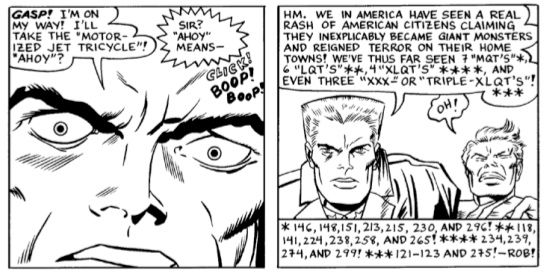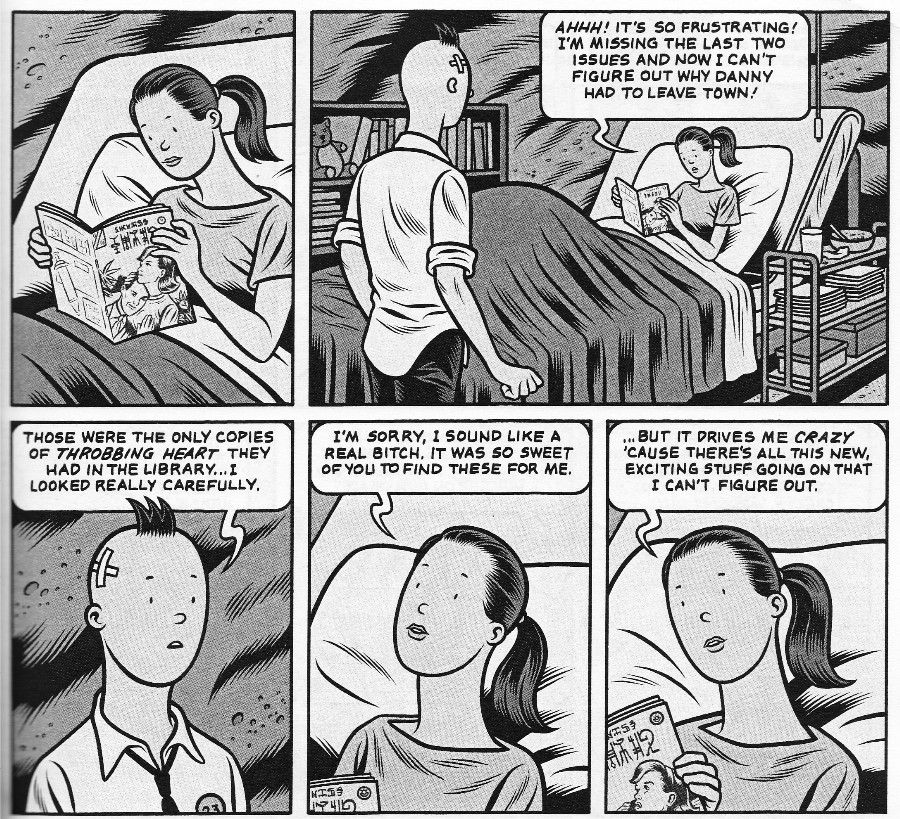In a recent interview, filmmaker Rian Johnson was asked about the potential for a sequel to Looper. He said he was grateful that people thought the world could sustain more exploration, but ultimately it’s not something he’s interested in. Among other reasons, he’d rather let the unseen parts of the movie remain unseen. “Even if you do feel like you want to see more of it,” he said, “do you really want to see more of it?” He continues, “I think there’s something powerful about it being mythology as opposed to it actually being narrative.”
We seem to have an innate desire to want The Whole Story. We want to see the Clone Wars. We want to know about the giant pilot from Alien. We want the history of the Bourne project. And all this got me thinking about comics as well as movies. When I was a kid, we didn’t have comics stores. I got my comics at the local drug store or supermarket, and my choices were limited to whatever what was on the spinner rack. There were no back-issue bins or eBay, so if I missed an issue – and I always missed issues – I was hosed. Every issue of Batman seemed to be continuing some story I didn’t have the beginning of. Every issue of Spider-Man ended on a cliffhanger that I’d never see resolved.
In these wonderful days of archive collections, it’s easy to get the whole story -- not just in comics, but with movies and TV series. We’ve gotten a little spoiled by it. This came up in a conversation I recently had with Chris Wisnia about his two, giant-monster comics, Giant Monster Adventures and the brand-new Monstrosis. The concept behind both is that they’re collections of material from a fictional, ‘50s comic called Doris Danger Seeks … Where Monsters Creep and Stomp. When I reviewed Giant Monster Adventures, I wrote, “If DDSWMCAS had been a real comic, that endeavor and this collection would be disappointments. Out of the hundreds and hundreds of issues that ‘existed,’ a little less than a dozen stories made it into this volume.” The “collection” isn’t complete – or even in order – and Wisnia’s received some criticism about that.
It was that criticism that I was eager to talk to him about. As much as I liked Giant Monster Adventures, I expressed in my review that I wanted more. “For what it is – an unsystematic collection of short stories from a fictional comic – [it’s] awesome. There’s more than enough here to delight anyone who loves joy. […] But because each story is part of a larger epic that doesn’t actually exist, they’re also rather unfulfilling on their own.” I point that out to confess that when I talk about our being spoiled, I’m including myself. I hear awesome things about The Good Wife, but I’m not going to jump in mid-series. I’m going to wait until I have time to start at the beginning and catch up. Wisnia’s point – in both Giant Monster Adventures and Monstrosis – is that we’re missing out when we insist on taking in stories that way. I think he’s right.
When I read those issues of Batman and Spider-Man as a kid, I wanted the rest of the story. I had a love/hate relationship with the little, editorial captions instructing me to “See #156” or whatever. I loved knowing that Spider-Man lived in this complex, always-developing world, but hated that I’d never be able to explore all of it. It was that tension that eventually hooked me on monthly comics once I had a local comics shop and enough disposable income to keep up with a series. (Ironically, my first stab at following a monthly series was John Byrne’s Alpha Flight, a comic I got into because I saw the first issue for sale, but quickly realized was steeped in old X-Men continuity. Even jumping in at the beginning, I still had tons of back issues to track down to get the team’s full history, including expensive, early appearances of Wolverine.)
But – back to me as a kid – knowing that I wasn’t going to get the whole story, I made do with imagining in my head how Batman got into the Joker’s trap or how Spidey was going to escape the Green Goblin. Now that I’m an adult with access to Showcase Presents and Essential, I don’t have to imagine those stories any more. I can read them and know the definitive solution to those mysteries. What I had mythologized in my head is now a part of the narrative. The problem is, like Rian Johnson predicted, the narrative is never equal to the mythology.
The Star Wars prequels were never going to be as cool as the Clone Wars I thought up as a child. That didn’t stop me from wanting to see them, but they couldn’t possibly be as good as the tailor-made fantasies I’d created. Same with those missing superhero stories from my childhood. And though Wisnia continues to create stories in the Doris Danger universe, he tells me that there are hundreds, if not thousands of stories he’ll never get to. And that’s part of the fun. Readers get to fill in those gaps for themselves.
This isn’t about making rules. I’m not saying that there should never be any prequels, sequels, or other forms of gap-filling. But maybe this is something we should be questioning more? Maybe we shouldn’t rush to buy something just because it tells the untold story behind something else we enjoyed. Conversely, maybe we shouldn’t be as reluctant as we are to try things that we haven’t been in on from the very beginning or don’t have the whole story to. Maybe - sometimes - we should let our own imaginations create mythology that's better than the narrative could ever be.
What do you think?


